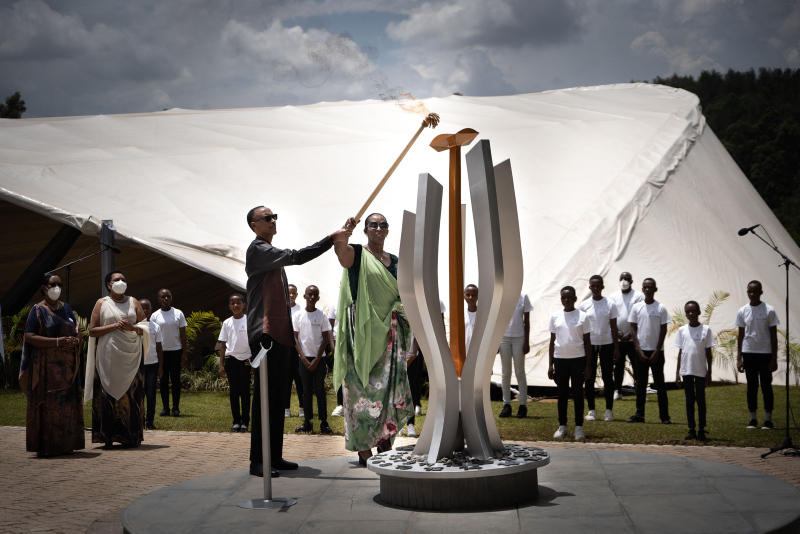Rwandans paused Thursday to mark the 28th anniversary of the 1994 genocide against the Tutsi ethnic group at nationwide remembrance ceremonies to honor 1 million people killed in 100 days.
Thousands gathered at memorial sites in the national capital of Kigali and across the country to lay wreaths on graves where victims are buried, but with a sense of determination to move forward after nearly three decades.
About 1 million people, mostly from the Tutsi community and moderate Hutus, were killed by Hutu extremists.
The main event was held at the Kigali Genocide Memorial, where more than 250,000 victims were laid to rest.
President Paul Kagame and first lady Jeannette Kagame were in attendance where the dean of the diplomatic corps and representatives of survivors paid their respects.
As is the norm, Kagame lit the "Flame of Remembrance" at the memorial.

Every year that passes makes Rwandans stronger and better people, said Kagame.
He aimed his speech at those criticizing his justice system on the back of hundreds of genocide fugitives still at large.
"You can even imagine people who doubt our justice system, yet Rwanda abolished the death penalty in its laws not because anybody influenced or put pressure on us at a time when it had so many people to be justifiably hanged. And you turn and say that we do not have justice," he said. "Rwanda is a small country but big in justice. We believe in the rule of law."
The government said more than 1,000 suspects have taken refuge in different countries including France, the US, Netherlands and Canada but authorities in those countries are unable to prosecute or hand over the suspects.
"Some of those big and powerful countries are very small in justice and therefore have no lessons to teach anyone because they are part of this history that saw over 1 million people perish, they are the cause, as Rwandans just executed killing their fellow Rwandans," he said. "Some genocide suspects are even protected by the very countries that talk about justice."
Concerning genocide denial and distortion, he said "yet as we know they create false stories about people, about Rwanda, about genocide and when you want to present facts there is much power to tell everyone not to give you space to answer back, to argue."
The National Unity and Civic Engagements Minister Jean Damascene Bizimana attributed the genocide to bad governance.
"We remember our slain dead for what they were. In our lives, they are unforgettable," said Bizimana.
In a message marking the annual April 7 International Day of Reflection on the genocide against Tutsis, UN Secretary-General Antonio Guterres said it "was neither an accident nor unavoidable."
"As we remember the bloodshed 28 years ago, we must recognize that we always have a choice: To choose humanity over hatred; compassion over cruelty; courage over complacency," he said.
On April 6, 1994, a plane carrying former Rwandan President Juvenal Habyarimana and President Cyprien Ntaryamira of Burundi was downed by a rocket attack, killing everyone on board.
The crash triggered massacres by Hutu extremists.